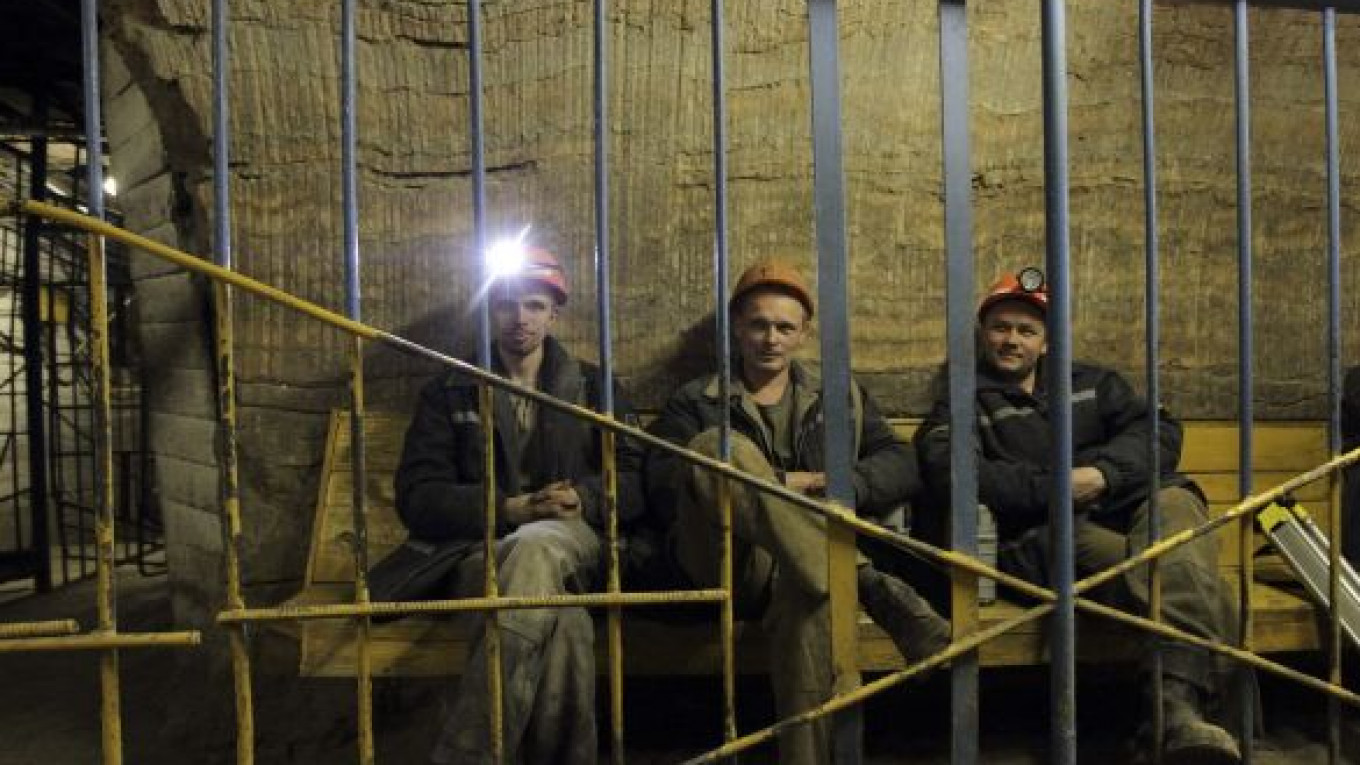Shares in the world’s largest potash maker, Uralkali, plunged by nearly 17 percent Tuesday following the company’s announcement that it pulled out of its alliance with Belaruskali — a decision that is expected to result in dramatic changes on the global potash market.
Uralkali slid by 16.9 percent in the middle of the day to reach 155.1 rubles ($4.7) per share — its minimum since October 2010. Investors’ frustration was a result of the company’s decision to change its sales policy and suspend a share buyback amid turbulence on financial markets.
The company’s chief executive Vladislav Baumgertner announced that the company would end its partnership with Belarussian Potash Company, its joint venture with Belaruskali, and direct all export sales through its Swiss-based subsidiary Uralkali Trading.
“Our cooperation with our Belarussian partners within the BPC framework has come to a deadlock,” Baumgertner said in statement on the company’s website.
Trader Belarussian Potash Company, or BPC, was establish in 2005 to export potash fertilizers produced by both Uralkali and Belaruskali. Along with Canada’s Canpotex, it controlled 70 percent of global potash trade, according to data provided by Reuters.
The decision by the Russian potash maker to quit the alliance with its Belarussian peer was triggered by a decree signed by Belarussian President Alexander Lukashenko in December that cancelled BPC’s exclusive right to export Belarussian potash.
“Following the issue of the decree, Belaruskali has made a number of deliveries outside BPC,” Baumgertner said in the statement. “We have repeatedly informed our Belarussian partners that such actions were unacceptable and they have ultimately destroyed the fundamentals of our prolonged fruitful cooperation.”
BPC could not be reached for immediate comment Tuesday. A senior executive at Belaruskali told Reuters that Uralkali’s decision to quit the partnership “came as a surprise.”
Baumgertner also forecast that changes in his company’s supply policy might have a dramatic effect on the global potash market, leading to a 25 percent drop in prices.
“We see the potash price may fall below $300 a ton after the change in our trading policy,” he told journalists, Bloomberg reported. The price currently stands at about $400 per ton.
The breakdown of Uralkali’s joint venture with Belaruskali is “a revolution on the global potash market,” said Yelena Sakhnova, an analyst at VTB Capital. Previously global potash sales were controlled by two players, BPC and Canpotex, which maintained prices at a high level by halting output, she said.
The end of this oligopoly will inevitably result in the fertilizer price going down in the wake of growing competition on the market, Sakhnova said, adding that she sees the price declining by at least 30 percent from its current level.
In the changing market situation, Uralkali plans to increase output next year, Baumgertner said. The company intends to sell up to 13 million tons of fertilizers in 2014, up from the 10.5 million tons this year, he said, Interfax reported.
Analysts expect that falling prices for potash are likely to hit the market capitalization of global players like Uralkali, currently the most profitable company in the sector.
Given the stock market turbulence, Uralkali suspended its share buyback program, Baumgertner said, adding, however, that it might be resumed as early as September.
The announcement came just days after billionaire Alexander Nesis sold his 5.1 percent in the company following a similar move by Uralkali shareholder Zelimkhan Mutsoyev, who disposed of his 6.43 percent stake earlier this month.
Contact the author at irina.filatova@imedia.ru
Related articles:
A Message from The Moscow Times:
Dear readers,
We are facing unprecedented challenges. Russia's Prosecutor General's Office has designated The Moscow Times as an "undesirable" organization, criminalizing our work and putting our staff at risk of prosecution. This follows our earlier unjust labeling as a "foreign agent."
These actions are direct attempts to silence independent journalism in Russia. The authorities claim our work "discredits the decisions of the Russian leadership." We see things differently: we strive to provide accurate, unbiased reporting on Russia.
We, the journalists of The Moscow Times, refuse to be silenced. But to continue our work, we need your help.
Your support, no matter how small, makes a world of difference. If you can, please support us monthly starting from just $2. It's quick to set up, and every contribution makes a significant impact.
By supporting The Moscow Times, you're defending open, independent journalism in the face of repression. Thank you for standing with us.
Remind me later.






